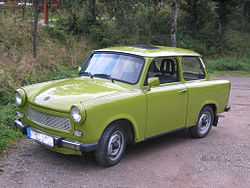Trabant 601
| Trabant 601 | |
|---|---|
 | |
| Overview | |
| Manufacturer | VEB Sachsenring |
| Model years | 1963–1990 |
| Assembly | Zwickau, Germany |
| Body and chassis | |
| Body style |
2-door sedan (Limousine) 2-door station wagon (Universal) doorless jeep (Kübelwagen) |
| Layout | FF |
| Powertrain | |
| Engine | 594,5 cm³ two-stroke two-cylinder |
The Trabant 601 (or Trabant P601 series) was a Trabant model produced by VEB Sachsenring in Zwickau, Sachsen. It was the third model in the history of the company, built for the longest production time, from 1963 to 1990. As a result, it is the best-known Trabant model and often referred to simply as "the Trabant" or "the Trabi". During this long production run, 2,818,547 Trabant 601s were produced overall and it was the most common vehicle in former East Germany.
Overview

With hindsight it can be considered East Germany's response to West Germany's 'Peoples Car', the VW Beetle.[1][2] Its purpose was to provide a cheap but still reliable car that was very affordable and also easy to repair and maintain. Still it was at the time of its release rather modern in many ways, with front wheel drive, a low maintenance engine, unitary construction, composite bodywork and independent suspension all around. The main letdown was the pre-war DKW based engine that was competitive when launched, but from the late 1950s into the 1960s small economy cars in western countries that used two-stroke engines, were replaced with cleaner and more efficient four-stroke engines, as employed from the start in the Volkswagen Beetle. Two-stroke engines of this sort, with crankcase scavenging and lubricating oil provided during fuel intake, burn their lubricating oil by design and produce smoky tailpipe emissions. However, two-stroke engines were also to be found in cars like the Western German Auto Union 1000 that ended production in 1963, and the Swedish Saab 96 that changed to four-stroke in 1967. Whereas lack of development funds in East Germany forced the continued use of a two-stroke engine in the Trabant, that went from obsolescent in the 1960s to embarrassingly obsolete by the 1980s.
Variants

- Trabant 601 Standard (as Limousine & Universal).
- Trabant 601 S (Sonderwunsch - Special Edition) With optional equipment like fog lamps, rear white light and an odometer (as Limousine & Universal).
- Trabant 601 DeLuxe. Like the 601 S and additional twin-tone colouring and chrome bumper (as Limousine & Universal).
- Trabant 601 Kübel (added in 1966). Jeep version with no doors, folding roof, auxiliary heating system, ignition system is RFI shielded.
- Trabant 601 TRAMP (added in 1978). Civilian version of the Trabant Kübel, mainly export to Greece.
- Trabant 601 Hycomat (P601 H), 1965–1990, in limited numbers (as Limousine & Universal). Made only for users with missing or dysfunctional left leg. It had included an automatic clutching system.
- Trabant 800 RS. Rally version (1986–1988) with 771 cm³ engine and 5-speed manual transmission.
The 601 today


Many former DDR citizens have mixed emotions in regards to their "Trabi", which still is a symbol for the demised DDR,[3] since it was a part of the system.[4] In recent years, these distinctive cars have become collectors' items, with growing popularity. Green Trabants are especially popular, as they are said to bring good luck. Many Trabant owners' clubs exist throughout Europe and 601s have their fans all over the world.[5] Also, many Trabant 601s are still used as rally racing cars.
As a symbol for a forgone era, it has inspired movies such as Go Trabi Go that presented the Trabi as a kind of East German character and could make former DDR citizens laugh "not precisely at themselves, but at the absurdities of the system under which they lived until last year."[6] It has also seduced people like the American actor David Hasselhoff to drive a "Trabi", although he had trouble to getting into it.[7] Stephen Kinzer of The New York Times likens the Trabi as a symbol for the people who built it, who “survive[d] through difficult times and ultimately triumph[ed]”.[6] The car was also featured in the American film Everything Is Illuminated.[8]
References
- ↑ "The Trabant was East Germany's answer to the peoples car as the Volkswagen Beetle was to West Germany". Retrieved 2011-05-02.
- ↑ "It's the VW Beetle of Eastern Europe". Retrieved 2011-05-02.
- ↑ Rodden. p. 176. Missing or empty
|title=(help) - ↑ "The Trabant was, from the point of view of the East German leadership and its bureaucracy, part of a larger, overarching "system of movement"". Retrieved 2011-05-02.
- ↑ "These once forlorn vehicles from Eastern Europe enjoy a nostalgic revival all over the world". Retrieved 2011-05-02.
- ↑ 6.0 6.1 Kinzer, Stephan (March 7, 1991). "CHEMNITZ JOURNAL; That Good-for-Nothing Car Is Good for a Laugh". The New York Times. Retrieved 2009-11-03.
- ↑ "It is really funny how he barely could fit inside". Retrieved 2011-05-02.
- ↑ "Trabant 601 Trombi/Estate featured in Everything is Illuminated". Internet Movie Database. Retrieved 2010-10-22.
External links
| Wikimedia Commons has media related to Trabant 601. |
- Original DDR commercial for the Trabant
- History of the manufacturer VEB Sachsenring
- "Tribute from the heart, dedicated to this strange little East German car that kept the masses moving"
- "A club that welcomes owners and drivers of these vehicles"
- Trabant 601 S de Luxe Exterior and Interior in Full 3D HD